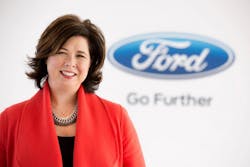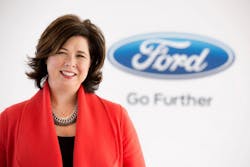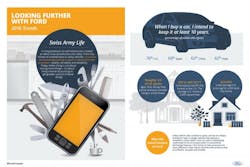Sheryl Connelly (seen at right), Ford’s global trend and futuring manager, noted that the insights gleaned from such “trend reports” drive every aspect of the company’s business – from overall strategy and development of future products and services to the customer purchase and ownership experience.
Such findings should also be of interest to trucking companies as, of course, they affect the types, volumes, and patterns of freight shipments throughout the U.S. as well as around the globe
Ford’s Connelly noted that changing views on health, consumption, transportation and work models are upending what she calls “traditional ways of thinking,” with innovation and technology rapidly ascending to transform culture and consumer behavior. Here are some examples:
- Globally, more than half of Millennials agree that standing out is more important than fitting in, revealing an increased focus on self-reliance and purposefulness according to Ford.
- Nearly seven in 10 consumers now say that "contrarian ideas" are celebrated as critical to shaping great ideas, and should be celebrated. As a result, mainstream connections between brands and consumers are taking a back seat to more unique, personalized and meaningful ties.
- The rising emphasis on self-reliance is creating what Ford dubs an an “ethos of purposefulness and utility.” From the desire for “tiny” homes (100 to 400 sq. ft. vs. the 2,000 sq. ft. U.S. home average) to smartphones to utility vehicles, consumers are increasingly seeking to attain a “trifecta” from their purchases - quality, versatility and durability.
- Consumers today seem to be focusing on “living smarter” by pushing to get greater use out of fewer things and using things longer; what’s being called a “Swiss Army Life.” One example: 76% of U.S. adults say that when they buy a car, they plan to keep it at least 10 years.
- This is also putting a different twist on environmentalism. Globally, Ford discerned 90% of adults agree that society has an obligation to reuse materials and reduce the amount of trash it creates. That means everyone needs to play a role – business, government and individuals alike.
- Finding ways to get creative with refuse – extracting value from stuff nobody wants – is the latest trend in sustainability promises to push the boundaries of both imagination and resourcefulness, Ford noted.
- Members of an expanding aging population are proactively seeking to prolong their quality of life and personal freedoms. That’s good, because two billion people are expected to be over the age of 60 by 2050; twice the number today.
- While innovation is driving new ways to enhance quality of life, demands for connectivity and time are increasing, resulting in a society that is always “on-call.” For example, on average, Americans are now spending 4.7 hours per day on their mobile phones.
- Faith in leadership is ebbing as 68% of adults say they are disillusioned with civic and political leaders.
Indeed, according to the company’s trend report, nearly 75% of adults worldwide say greater mobility is important for global stability.
On top of that, 61% of the men and 54% of the women polled for this global study believe the benefits of “autonomous machines,” which includes self-driving vehicles, will outweigh the risks.
Yet that rate of “acceptance” by adults of both genders differs significantly by country, Ford found: it’s highest in China (73%) but low in the U.S. (42%).
Still, those numbers are high enough to convince Ford that taking connectivity, mobility, and autonomous vehicle technology to the next level remains a valid goal – one accentuated with greater focus on customer experience plus data and analytics. Such efforts will ultimately deliver safer, more convenient and efficient methods of addressing global transportation challenges, Connelly noted.
“There’s no escaping the impact the rapid pace of technology has on culture,” she explained. “What’s fascinating to watch is how companies adapt and innovate at this pace. These insights help us to create products and services that not only exceed today’s expectations [but] provide innovative ways of looking at how to tackle challenging situations of tomorrow.”
It will be interesting indeed to watch how many of those “trends” come to life.


